- Home
- Patrick E. Andrews
Glory's Guidons (The Long-Knives US Cavalry Western Book 3) Page 2
Glory's Guidons (The Long-Knives US Cavalry Western Book 3) Read online
Page 2
Pepperdine remembered the problem in his new company. “I’m sure the post commander considers himself very fortunate to have your uncle as his sergeant major.”
“He sure does! He said he’d shoot anybody that tried to take him away!” Minerva declared.
Pepperdine could well appreciate the post commander’s attitude. “And I bet he’d just do that too.”
“Uncle Alex was a house slave back on the old place. But he ran away when the Yankee soldiers come. Anyhow, he din’t chop no cotton in no field. He got etiquette. If the regiment ever gets back together again, they say he’s gonna be the permanent sergeant major.”
“And I’m sure he will be.”
“Well, I best get. I’ll be in to clean on Mondays and Thursdays. You just bundle up yer laundry the night before washday and I’ll see that it gets toted over to soapsuds row.”
“Soapsuds row?” Pepperdine said. “What’s that?”
“It’s where the married soldiers live,” Minerva explained. “Some of their wives make extry money doing laundry. That’s why I ain’t allowed to do no washing.”
“I presume that Monday is wash day.”
“Always is.”
“Thanks for straightening up, Minerva. The place looks just fine.”
Minerva smiled in genuine pleasure at the compliment. As she walked past him, the soap-and-water smell combined with her natural feminine odor stirred him suddenly. Four celibate years at West Point and the hard work required of him there had masked his maleness and its physical needs. He watched her walk out the door with a deep longing, then quickly turned his attention to settling in.
Pepperdine spent the next half hour in a flurry of work, unpacking and putting away his things in order to clear the fevered thoughts from his mind. The girl had so unnerved him that only then did he notice there were no coverings on the bare slats of the bed. He was reaching for his forage cap to make a quick trip to the post quartermaster when loud knocking sounded on the door.
Two soldiers stood at attention in the doorway. The taller acted as the spokesman. “We got your bedding and a bucket of water for your washroom, suh.”
“I was beginning to wonder about that,” Pepperdine said, motioning them in. The soldier with the bucket walked past him and stepped out into the backyard. Pepperdine hadn’t thought of investigating the rear area of his new home, and he followed him.
He found that his washroom and backyard were one and the same. The entire area was enclosed in a narrow rectangle of sod fencing some twenty feet long. A table by the back door received the bucket. A glance down at the end of the yard revealed the location of his privy. The soldier sat the water in its place and, spoke to him. “You get a fresh pail ever’day, suh. And quicklime throwed down your shithouse ever’ Friday.”
Pepperdine glanced back inside the quarters. “Are there any stoves handy? I hate cold shaving.”
“There was a stove here, but Lieutenant Norton got it when his busted apart. There ain’t been nobody living here since the end of winter anyhow. I don’t reckon the quartermaster’s got an extry one now. Maybe the farrier sergeant can help you out.”
“I’ll see to that quickly enough,” Pepperdine said irritated. “I just wish Lieutenant Norton had been more careful of his own heating implement.”
“His broke when Cap’n Delaney throwed him against it. Them two was fighting about—“
“Never mind,” Pepperdine interrupted. “I’m not really interested in anyone’s personal affairs.”
“Yes, suh. You’re our lieutenant. I’m Private Griffen and this is Private Davis. We’re both in Cap’n Delaney’s L Comp’ny.”
“Fine. Then I shall see you at reveille tomorrow.”
“Yes, suh. By your leave, suh.”
Pepperdine was pleased to note they both came to an abrupt position of attention and snapped him salutes in a manner acceptable even at West Point. Delaney must have been doing a good job of teaching the company military courtesy.
Davis had made up the bed while Pepperdine and Griffen were outside and now there was nothing to do. He toyed with the idea of going back over to L Company’s orderly room, but changed his mind as the fatigue of his long trip settled over him like a smothering blanket. He opted for a nap instead.
~*~
It seemed he had just closed his eyes when an insistent pounding on the door awakened him. The dimness of the room revealed the lateness of the hour and a check of his watch showed he had slept for two hours. He stumbled across the room and pulled the door open.
“Sleeping, Mr. Pepperdine?” Captain Delaney asked.
“Yes, sir. I must have dozed off.”
“That was a good idea. As long as you’re assigned to this regiment, you’ll find it to your advantage to sleep whenever you get the chance. There’ll be many a wakeful hour before your uncle rescues you from our terrible clutches.”
“Yes, sir,” Pepperdine yawned. “Sit down, won’t you?”
“What the hell on? The floor?”
“Oh! I didn’t notice I had no chair. I’d better see the post quartermaster about it tomorrow.”
“See Minerva. She shifts furniture between the officers’ quarters like she owned them. She’ll get you a chair.”
“I’ll look her up, sir.”
“We don’t have much time for sitting around and chatting anyway, Mr. Pepperdine. I came by to fetch you to dinner. Mrs. Dearborn is anxiously awaiting to make your acquaintance. She’s very impressed by us West Pointers.”
“Are we going to dine before retreat?” Pepperdine asked, slipping into his tunic.
“Retreat was a half hour ago. You slept right through it. Let’s snap it up. It wouldn’t do for you to incur Her Highness’ displeasure at this tender point in your army career. Always remember, Mr. Pepperdine, the word—and more importantly—the pen of your commanding officer is most oft wielded by his wife.”
“I’ll keep that in mind, sir,” Pepperdine said, opening the door and stepping back to allow his company commander to precede him.
Major Harrington Dearborn’s living quarters were located beyond his office in the post headquarters building. It was here that the officers would gather for a gentlemanly libation before dutifully trooping in to participate in Mrs. Dearborn’s dinners. Even the so-called informal ones during the week had a certain ceremonial air about them.
Pepperdine and Delaney entered the office, and as the captain went to pour himself a large drink, the young lieutenant stiffened to attention and reported to the post commander. Dearborn returned the salute and offered his hand. “Sorry to have missed you earlier, Lieutenant, but duty had called me out to the agency.”
Delaney looked over at him. “Is there any problems over there, sir?”
“A bit of tension between old Strong Bear and young Running Horse.”
Delaney took a long drink. “There’ll be trouble ahead.”
“No doubt,” Dearborn agreed. He turned his attention back to Pepperdine. “I always try to be present when a new officer reports in, but sometimes these matters are difficult to coordinate, hey?”
A plump officer slurped down the remaining whiskey in his glass and stepped forward, offering a pudgy hand. “I’m Blakely, post quartermaster. Glad to know you, Pepperdine.”
“Pleasure, Sir.”
“I suppose you’ve already met our adjutant Norton, and of course you know Captain Delaney. So allow me to introduce Captain Cranston who has K Company and Captain Fenton who leads M Company on its sure and steady course to glory.”
Cranston nodded over his drink, his expression displaying neither pleasure nor displeasure at meeting the new arrival. Fenton offered his hand with an obligatory smile, but remained silent, turning his attention back to his drink.
“Help yourself to the bottle, Lieutenant Pepperdine,” Major Dearborn said. “This is where we begin our evening socials and also end them.”
“Yes, sir. Thank you.” Pepperdine went to the cabinet and poured himself a littl
e whiskey into a glass.
Dearborn continued, “We’ve assigned you to Delaney because Cranston has a good first sergeant and Fenton has a company clerk who can read and write. Since Delaney was laboring on his own down with the L’s, I thought it only fair that he be given the extra field officer.”
Delaney took a deep swallow of whiskey, nodding toward the new second lieutenant. “I’m afraid Mr. Pepperdine won’t be with us long. He’s going to put in for a transfer.”
Dearborn laughed. “That’s something we all do as regular as clockwork. Except for Delaney of course. He’s resigned to being a jack-of-all-trades in a colored regiment.”
“Mr. Pepperdine may enjoy a bit more luck in getting out of here than you gentlemen,” Delaney informed them. “His uncle just happens to be the adjutant general of this man’s army.”
“Good Lord!” Cranston laughed without humor. “What poor devil made the remarkable mistake of assigning you to this outfit? His head will roll before this episode is over.”
“My uncle, the adjutant general, made this assignment personally,” Pepperdine said.
“You obviously are not his favorite nephew then,” Blakely remarked. “Not only did he place you in a colored regiment, but he chose one in the most trying of circumstances.”
“Perhaps,” Pepperdine said. “However, I’m not aware of our duties as of yet.”
Dearborn looked over at Delaney. “You haven’t filled him in our mission here?”
“No, sir,” Delaney said. “I’ll take care of that tomorrow. I just thought I’d give him a chance to settle in, no matter how briefly.”
“Our purpose here is simple enough,” Dearborn explained. “We maintain a constant vigilance in this area and concentrate our efforts on the Proviso Indian Agency a couple of miles south of here.”
Cranston poured another drink. “What it all boils down to, Pepperdine, is that when any of the young Indian bucks get fired up and jump the agency, we chase them down and bring them back. That’s the gist of it, plain and simple. Naturally, it took the War Department a hundred pages of instructions—in triplicate—to acquaint us with our duties. But that’s the way it is with all the frills removed.”
“It sounds like it might be exciting at times,” Pepperdine said. “What tribe is at the agency?”
“They’re an off-shoot Comanche clan,” Delaney answered.
“That is exciting. The Comanches have a reputation of being fierce fighters.”
“And a well deserved one,” Cranston conceded. “In fact, I can think of nothing more exhilarating than chasing a band of murderous savages while leading an equally savage group behind me.”
A knock on the door interrupted further conversation. A white-jacketed soldier stepped into the room and snapped to attention. “Dinner is served, suhs,” he announced gravely.
“Shall we join the ladies?” Dearborn asked, leading the way in.
Pepperdine finished off his drink and followed, growing more curious about this bizarre unit he had been sent to soldier with.
Chapter Three
Captain Ambrose Delaney waited as the other officers filed ahead of him into the commander’s quarters. He motioned the ever respectful Pepperdine to precede him, then he followed after the group, stopping at the door. He still held his drink in his hand as he glanced into the dining room. Two women, the only white females at Fort Proviso, stood waiting for the men to gather near the table.
~*~
Although Delaney was not the highest ranking officer in the regiment, he had seen more years of active service than any of the others. Unfortunately for him, his career had been one of those spotty ones with periods of promise overshadowed by an abrasive personality. At West Point, he was certainly not the most brilliant cadet in his class, but he was tenacious, latching onto the courses of instruction with a bulldog-like grip, shaking and teasing them until he had consumed all the intellectual nourishment they offered. His recitation in class, while blunt and without embellishments, was complete and exacting. Attempts from the professors of military science to make Cadet Delaney elaborate a point was met with exact repetitions of the previous discourse. While technically correct, it was certainly no way to get ahead or attract favorable attention in the classroom.
After his commission and appointment to a cavalry regiment on the frontier in 1845, he immediately made good impressions on his superior officers. Unfortunately this was the only time during his entire career he found favor from those who outranked him. Delaney performed his duties, not only to the letter, but well beyond any expectations. He could read deep import into the instructions and orders he received, thus his performance of duties made him look good. Better yet, it made his superiors look good. As the country moved into the Mexican War, it would have appeared that Lieutenant Delaney was well on his way to high rank in the United States Army.
Had he stayed within the regular army’s framework during the conflict in Mexico, he might have made high brevet rank or even gained a permanent promotion, but bad luck began to make an appearance with regularity that was to plague him the rest of his career.
It all started when Delaney was put on detached duty to command a small squadron made up of one company of dragoon regulars and one of ill-disciplined volunteer militia from Kentucky. The militiamen had elected their own officers and could see no reason whatsoever to follow the orders of the young upstart Delaney. After all, the West Pointer expected them to cut back on their drinking and even be punctual at drill call. This did not meet their idea of what soldiering was all about, and they would have none of it.
Delaney decided the militia company was a lost cause, but he was stuck with them. Therefore he approached the problem from another angle. He informed the amateur soldiers that they might do as they pleased, but they were to stay out of the way of the regulars since the professionals would be busy preparing for battle. He concluded his caustic address with the remark, “We really don’t think you have any fighting spirit, so you’re not of much use to us.” With that he began ignoring the militiamen and training the other company.
The first week went by with the regulars drilling as the whiskey-sodden civilian-soldiers watched them from their own camp. After that, a few shamefaced militiamen began making an appearance at drill call. Their numbers increased daily until Delaney was informed that they had elected a new set of officers, ones with military experience this time, and would he please consider them as part of his small squadron. Delaney rubbed his fingers thoughtfully through the brand new moustache he was raising and reluctantly agreed to give them an opportunity to prove they could cut the mustard.
When he rejoined the main column a month later, he had two full companies of dragoons, all fully drilled and ready for active service in the field. But militia was militia, and at crucial moments their performance wasn’t up to par. That, combined with a violent argument between Delaney and a senior staff officer regarding the deployment of his unit before the Battle of Cerro Gordo, began the downhill route of his career. Several more confrontations occurred before the war ended and Delaney returned to his regiment still a second lieutenant without a promotion to mark the end of his first shooting war.
He took a furlough and returned to his small hometown in Vermont just after the war. A chance meeting with a childhood sweetheart, Matty Hammond, blossomed into a courtship. They married within a few short weeks, and Delaney, with his bride, traveled to his new post in Pennsylvania. The marriage turned out to be brief, bitter and childless.
They were divorced after a year and a half. Within a short time Matty married a businessman in the town near the post where they had been stationed. She gave up the one room shack on officers’ row for a large two-story frame mansion complete with a small staff of servants. Delaney continued on soldiering, taking to the bottle in lengthy, angry bouts of drinking. This frequent imbibing only served to spur on his candid remarks regarding superiors and subordinates alike.
His attitude never improved, and he permanently s
ealed himself into the lower company grade ranks during the four years of fighting against the Confederate States.
He did manage to reach the rank of captain, however. This was not so much because of his superiors forgiving a stinging, insubordinate tongue, but mainly because of the inferiority complex the Union cavalry felt from time to time. If the Confederate dandies cutting up behind Federal lines weren’t bad enough, the Union infantry, whose combat duties were much more intense than those of the horse soldiers, poked fun at them at every opportunity.
The result was that the cavalry went out looking for Confederates to fight, and when they managed to make contact with the enemy, the horse soldiers generally celebrated with foolhardy charges in which they sustained overwhelming casualties. Ambrose Delaney was as reckless as the rest but managed to survive these debacles and thus worked himself upward in rank simply through the attrition provided by the high casualty rate. When there was absolutely no one else to promote, they had to choose Delaney.
The war’s end found him a captain, but his luck took another bad turn and his unit was disbanded. In an army where commissions were given in regiments and not branches of service, this was a personal disaster for Captain Ambrose Delaney. But the sudden activation of two new cavalry regiments for service on the frontier offered him an alternative. He was confused by the lack of applications for the new vacancies until he found out the outfits were to be made up of colored soldiers, officered by whites.
It was at this time that Delaney finally faced up to what his status was in the army. Friendless, without influence, he had no choice but to accept the posting. He reported for duty with the shoulder straps of a captain firmly sewn to his uniform, full knowing that they would stay there until the day he retired from this overworked, disjointed regiment to which he had been assigned.
~*~
Now, in Major Dearborn’s quarters, Delaney drained his drink, then joined the others. Pepperdine went through another, but shorter, round of introductions. He first met Ramona Dearborn, the commander’s wife. She had a tendency to flutter when she was excited, and the news that Pepperdine was a West Pointer was enough to set her off. She took his arm and led him around the table to personally introduce him to Emma Norton, wife of the adjutant. Mrs. Norton was a slender lady in her late thirties. Her graying hair was swept back tied into a bun with the careless haste of a woman who considered her personal toilet an inconvenience of a busy life.

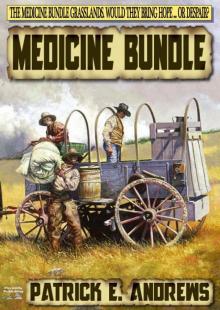 Medicine Bundle
Medicine Bundle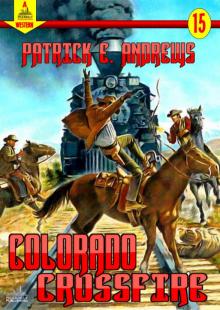 Colorado Crossfire
Colorado Crossfire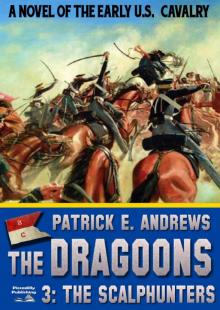 The Dragoons 3
The Dragoons 3 The Devil's Bonanza (A Piccadilly Publishing Western Book
The Devil's Bonanza (A Piccadilly Publishing Western Book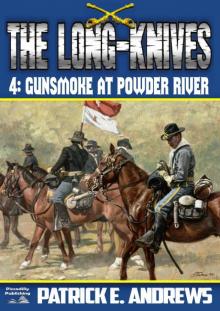 Gunsmoke at Powder River (The Long-Knives #4)
Gunsmoke at Powder River (The Long-Knives #4)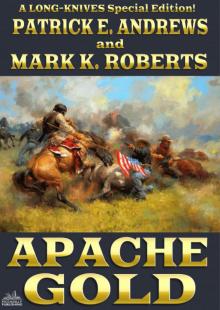 The Long-Knives 6
The Long-Knives 6 The Ghost Dancers (A Crossed Arrows Western Book 2)
The Ghost Dancers (A Crossed Arrows Western Book 2)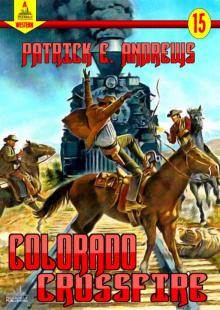 Colorado Crossfire (A Piccadilly Pulishing Western Book 15)
Colorado Crossfire (A Piccadilly Pulishing Western Book 15)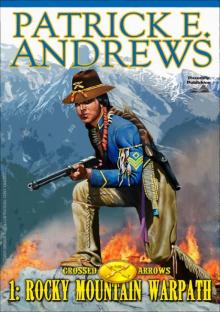 Rocky Mountain Warpath (A Crossed Arrows Western Book 1)
Rocky Mountain Warpath (A Crossed Arrows Western Book 1)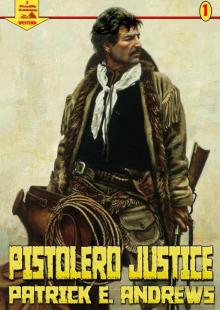 Pistolero Justice (A Piccadilly Publishing Western
Pistolero Justice (A Piccadilly Publishing Western Oklahoma Showdown (An Indian Territory Western Book 1)
Oklahoma Showdown (An Indian Territory Western Book 1) Crossed Arrows (A Long-Knives Western Book 1)
Crossed Arrows (A Long-Knives Western Book 1)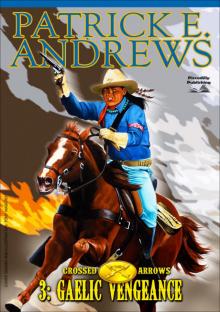 Crossed Arrows 3
Crossed Arrows 3 Blood of Apache Mesa
Blood of Apache Mesa The Long-Knives 5
The Long-Knives 5 Desperado Run (An Indian Territory Western Book 2)
Desperado Run (An Indian Territory Western Book 2)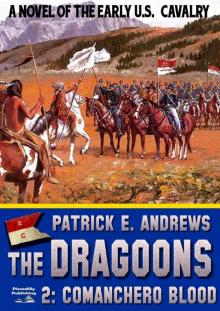 Comanchero Blood (A Dragoons Western Book 2)
Comanchero Blood (A Dragoons Western Book 2)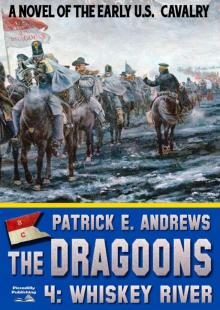 The Dragoons 4
The Dragoons 4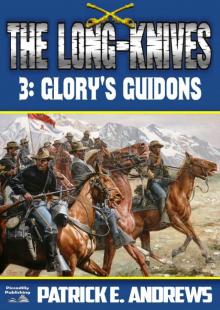 Glory's Guidons (The Long-Knives US Cavalry Western Book 3)
Glory's Guidons (The Long-Knives US Cavalry Western Book 3) Indian Territory 3
Indian Territory 3 Texas Trails 1
Texas Trails 1